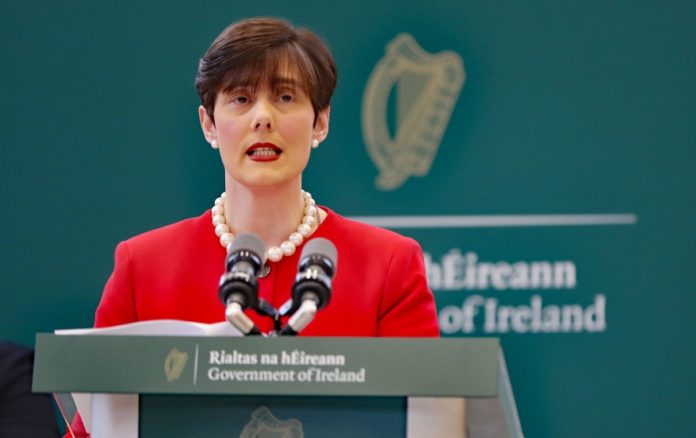By Michael O’Farrell and Valerie Hanley
FAILURE to adopt appropriate measures against new Covid variants of concern could see schools closed again, the latest risk assessment from Europe’s Covid watchdog warns.
The gloomy appraisal comes just as the Government prepares for the phased reopening of schools from next month for primary school classes and Leaving Cert students.
In its latest advice this week, the European Centre for Disease Prevention and Control (ECDC) is warning that measures employed in previous waves will not be enough to deal with new variants.
‘More measures or stricter compliance will be needed to get the same results as those achieved in the pre-variant situation,’ its assessment reads.
In relation to schools the ECDC is warning that ‘in-school mitigation measures’ will have to be stronger than they were before variants emerged.
The report warns that failure to augment mitigation measures to deal with Covid variants of concern (VOCs) – in schools and in the wider community – could, as a last resort, mean schools will have to close again.
‘Increased community circulation of SARS-CoV-2 VOCs may lead to the need for school closures, either in response to school-specific outbreaks or to alleviate current or anticipated pressure on community transmission and the healthcare system,’ it says.
The ECDC analysis is based on prediction models worked through by the London Centre for the Mathematical Modelling of Infectious Diseases (CMMID) on the UK variant, which now accounts for 90% of new cases in Ireland.
‘Control measures of a similar stringency to the national lockdown implemented in England in November 2020 are unlikely to reduce the effective reproduction number, or R rate, to less than 1, unless primary schools, secondary schools, and universities are also closed,’ the CMMID prediction concludes.
According to the CMMID modelling, ‘large resurgences of the virus are likely to occur following easing of control measures’ such as the reopening of schools.
This prospect is behind the caution expressed by Tánaiste Leo Varadkar who this week declined to offer certainty to parents of school-going children as the Government prepares to begin reopening schools. Mr Varadkar said it would not be responsible of him to use words like ‘certainty’ and ‘guarantee’ even though case numbers are at levels in which schools were open last autumn.
‘Schools were fully open at those levels back in September and October,’ he said. ‘But we now have the B117 variant which is much more transmissible. We just can’t say for sure what impact it will have as schools reopen on a phased basis throughout March and April.’ On foot of the ECDC’s warning that mitigation measures in schools must be heightened, the Irish Mail on Sunday asked Minister Norma Foley’s Department of Education what new measures had been put in place since schools closed before Christmas.
We also asked what had been done to ensure that adequate social distancing could be maintained on school transport services.
For logistical reasons many school buses were running at full capacity last term despite NPHET recommendations that social distancing be maintained.
A senior source in the Irish scientific community told the MoS: ‘Overall there was a lower transmissibility rate in schools. But the UK variant is hypertransmissible.
‘If you put a million people on the move, it’s not known what will happen because schools have been closed since before Christmas and because of what is not known it could be catastrophic.
‘The country could be back to a Christmas situation again. You cannot take the chance.
‘So that is why the reopening has to be very cautious. Because this UK variant is so infectious it will be known very quickly whether more students should be allowed back to school and whether schools should remain open.’ The source added: ‘Four and fiveyear-olds don’t spread or transmit Covid as much as adults and three, four and five-year-olds are probably the least at risk. That is why they are being brought back to school with Leaving Certs.
‘And until all the vulnerable people are vaccinated, you cannot take the chance of fully reopening schools. There have been cases where people were a close contact with a positive case for just two minutes and they contracted Covid,’ the source said.
It is now planned for all primary schoolchildren to be back in classes from March 15, with Leaving Certs back at the start of the month.
A spokesman for the Department of Education said: ‘The Department is involved in intensive talks with the primary and post-primary education stakeholders with a shared objective of delivering a cautious, phased return to schools at the earliest possible date in line with public health advice.
‘Under the framework recently agreed with teacher unions and school management, an initial phased return of children in special schools and special classes is already under way with children in special schools returning on a 50% minimum basis from February 11, and children in special classes in mainstream primary and postprimary schools making a full return from February 22.’ The agreed framework includes enhanced public health teams for schools, full contact tracing and bulk fast-track testing within the school setting.

